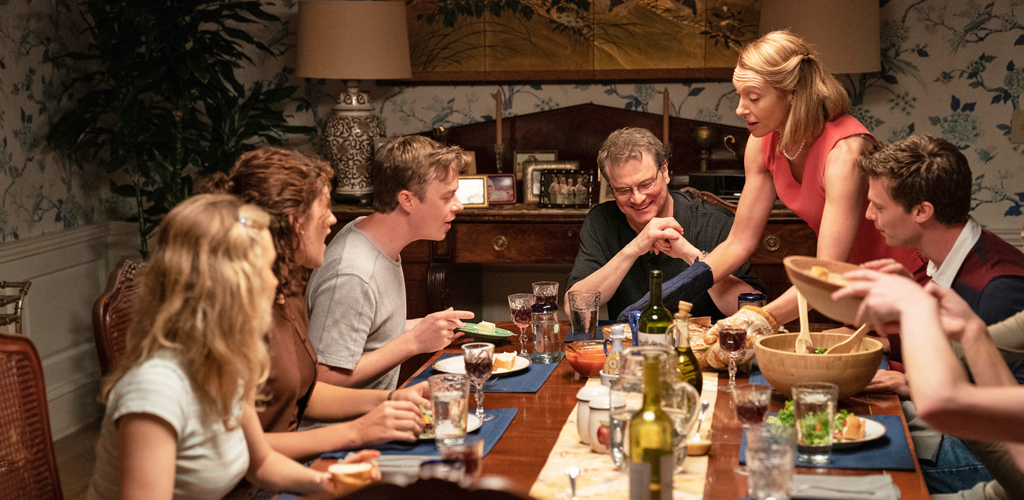
In the fourth episode of HBO Max’s The Staircase, which brilliantly condenses the Michael Petersen trial into one episode, defense attorney David Rudolf (played by a steamy salt and pepper bearded Michael Stuhlbarg) is trying to prepare the Petersen family for seeing disturbing images of Kathleen Petersen’s autopsy. Michael Petersen’s daughter Martha (Odessa Young) is uneasy. She doesn’t want to go. But her absence is a bad look for her adopted father, who is on trial for murdering his wife Kathleen, who was found dead at the bottom of the titular staircase in their Durham, North Carolina home. Michael, played by Colin Firth, is sitting next to Martha on a couch in their home, the same home where Kathleen tragically died of either a fatal accident or murder. Michael is as laid back as I am after a couple of glasses of wine watching a Robert Redford movie. He’s sunk into the couch, viewing the conversation more than he’s participating in it. He almost looks bored. “Maybe Martha could take one of Kathleen’s valium,” he says, still one with the couch, his hand on his head. Michael is hard to read. This scene is demonstrative of Firth’s performance, which is unlike any other from the bubbly Brit, who is typically a romantic lead or King George VI.
When news of a scripted version of this story first came out, I scoffed and decided I would not be watching. Over the years, true crime has spiked in popularity and as a result, has become exploitative and tired. Also, what more could I possibly learn about a true crime case after watching a many-hour documentary that spanned decades? I did, however, reluctantly start HBO Max’s The Staircase and was immediately proven wrong. From his very first moments on screen as Michael Petersen, Firth weaves between menacing and guilty, charming and innocent. His American accent is rhythmic. He speaks with purpose when he’s feeling confident and comfortable. But in the moments when Michael is more vulnerable – like after he is found guilty by the jury and hugs documentarian Jean-Xavier (Vincent Vermignon) and says he’s scared – his voice softens and slows down. While Michael Petersen (and Firth’s performance) is the centerpiece of The Staircase, it is the sprawling, unexpected perspectives that make the series so powerful and necessary.
The most vital perspective is Kathleen Petersen’s (Toni Collette), which The Staircase presents in a way that does not feel exploitative despite being slightly speculative. Leading up to her death – the show offers a harrowing, believable death scene applying to every theory – Kathleen has problems at work, with the kids, with her husband, and she is accident-prone (she injured her neck after diving into her pool during a party). The series also focuses on all of the children in the family, which gives both Michael and Kathleen more dimension by seeing their parenting. We also get to see how Kathleen’s death, the trial, and Michael’s time in prison and fighting the verdict affected every child. As you can probably imagine, it f*cked them up.
The Staircase turns the cameras around and shows what was going on between the filmmakers behind the documentary. It follows the filmmakers as they decide to pursue the Petersen case, the tensions as the producer believes Michael is guilty and the director believes in his innocence, and it reveals that the documentary’s editor Sophie is Michael Petersen’s current girlfriend, who is the woman in white, played by Juliette Binoche who has been present but kept a mystery throughout the series. “The only way to objectivity is by recognizing how subjective we are,” Sophie says in episode four. As Sophie is editing the footage, her empathy for Michael becomes a problem and causes even more tension in an already hectic post-production process, exemplified in a thrilling scene in episode five during a session while composing the doc’s rousing, now signature classical music-inspired score.
The Staircase also depicts a culture disturbed by anything unconventional in its portrayal of the prosecution’s flawed case against Michael, which not only makes up a weapon based on nothing but weaponizes his bisexuality. Quite like the documentary series, the series points out glaring flaws in the United States justice system. But its varying perspectives, from Kathleen to the prosecution, the kids to the documentarians, provide a human element while playing with your mind that the groundbreaking but narrowly focused documentary could not achieve. Just when you think you know exactly what happened on the night of December 9, 2001 after Michael and Kathleen Petersen watched America’s Sweethearts, you’re presented with something – or someone – that convinces you otherwise, and yet the show never feels manipulative, but deeply human.
